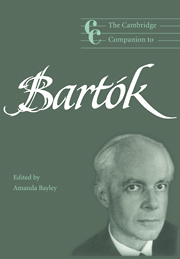Book contents
- Frontmatter
- Introduction
- Part I Contexts: political, social and cultural
- Part II Profiles of the music
- 3 Bartók's orchestral music and the modern world
- 4 The stage works: portraits of loneliness
- 5 Vocal music: inspiration and ideology
- 6 Piano music: teaching pieces and folksong arrangements
- 7 Piano music: recital repertoire and chamber music
- 8 The Piano Concertos and Sonata for Two Pianos and Percussion
- 9 Works for solo violin and the Viola Concerto
- 10 The String Quartets and works for chamber orchestra
- Part III Reception
- Notes
- Select bibliography
- Index
5 - Vocal music: inspiration and ideology
from Part II - Profiles of the music
Published online by Cambridge University Press: 28 September 2011
- Frontmatter
- Introduction
- Part I Contexts: political, social and cultural
- Part II Profiles of the music
- 3 Bartók's orchestral music and the modern world
- 4 The stage works: portraits of loneliness
- 5 Vocal music: inspiration and ideology
- 6 Piano music: teaching pieces and folksong arrangements
- 7 Piano music: recital repertoire and chamber music
- 8 The Piano Concertos and Sonata for Two Pianos and Percussion
- 9 Works for solo violin and the Viola Concerto
- 10 The String Quartets and works for chamber orchestra
- Part III Reception
- Notes
- Select bibliography
- Index
Summary
Bartók's mature compositions for voice are spread across a range of musical genres. Aside from the opera discussed in the previous chapter, there are six works for voice and piano, six for unaccompanied choir, one for double choir and orchestra with soloists, one for choir and piano, and there are also further arrangements of these works for voice and piano, voice and orchestra, and choir and orchestra. The common thread connecting the mixture of genres is folk music: not surprisingly, Bartók's passion for folk song is even more manifest in his vocal works than in his instrumental music. He wrote only two cycles of ‘art’ songs and his discovery of peasant music infiltrated even these. As he pointed out in 1920, there was no other vocal tradition in Hungary from which to develop a modern vocal style: ‘[w]e Hungarians have nothing but our parlando peasant melodies … to solve this question’, he wrote.
The use of peasant materials also carried a message, however: Bartók's initial aim in arranging folksong was to clarify a contemporary misunderstanding about the omnipresent gypsy music of Budapest, which was celebrated as Hungarian folk music. As his career progressed, his use of peasant materials came to intertwine increasingly with his nationalistic and then humanistic vision: whether or not he intended them to be active ‘agitators’, texts from folk sources came to embody his critical view of urban society. As József Ujfalussy wrote in 1971 of Bartók's From Olden Times (1935), ‘every word and every tone in this work was an undisguised political appeal’. The presence of text leads this ideological aspect of folklorism to dominate his vocal works.
- Type
- Chapter
- Information
- The Cambridge Companion to Bartók , pp. 78 - 91Publisher: Cambridge University PressPrint publication year: 2001



